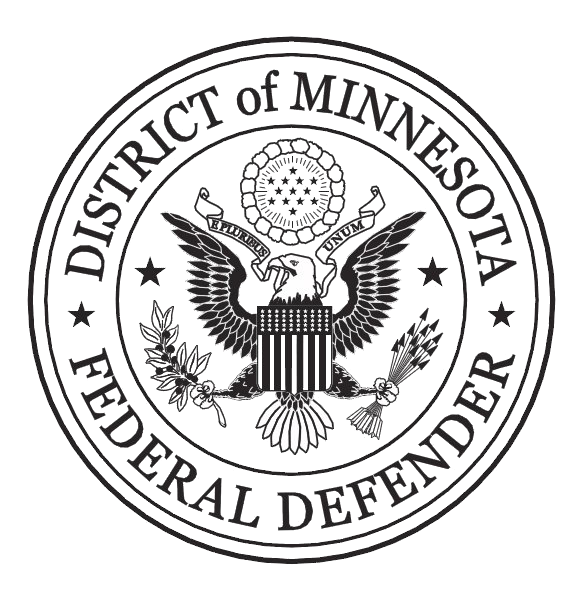Office of the Federal Defender
District of Minnesota
_________________________________________________________________________________________________________________________________
Copyright © 2025
Federal Defenders Office - District of Minnesota
Copyright © 2025
Federal Defenders Office - District of Minnesota

TRIAL
IN GENERAL: The trial date will usually be set when you are arraigned, but in almost every federal case this date will be rescheduled. Federal trials can be complicated and you must help your attorney and investigator prepare your case. Some decisions, like whether to testify, are yours to make after advice from your attorney. Decisions involving legal strategy and the way that your case should be presented are decisions for your attorney to make. You will be kept informed about these matters and consulted, but ultimately your attorney has the training and expertise needed to make these decisions.
It is the prosecutor’s job at a trial to prove that you are guilty. It is not your job to prove you are innocent. The prosecutor must prove the charges beyond a reasonable doubt for you to be found guilty. The jury’s decision has to be unanimous in order for you to be convicted.
SPEEDY TRIAL ACT: The law says that you must be tried no earlier than 30 days or later than 70 days after your first appearance. There are exceptions which can extend the 70 day limit. You may hear the term “excludable time.” This means that a certain period of time the court needs to make decisions about your case, or a certain period of time your lawyer needs to prepare your case, is not counted toward the 70 day limit. It is said that “the clock stops” for those periods of time. It is usually not beneficial for the defense to move the case forward quickly because time is needed to prepare a defense. In federal cases the prosecutor has often had months or even years to prepare the case before you have even been charged. Once you are charged and counsel appointed, defense counsel often needs additional time, just to catch up.
JURY: A jury of 12 people will hear your case and decide the facts. You, your attorney, the prosecutor, and the judge will participate in deciding who should be on the jury. The jury will be selected and then sworn in. You can give up your right to a jury if you and your attorney decide you would be better off having the judge decide your case, and if the prosecutor also agrees to waive the jury. Waiving a jury is very unusual and should be done only in the most extraordinary of circumstances.
OPENING STATEMENTS: Each side will get to make a statement to the jury about what the case is about, what the evidence will be, and what the jury will have to decide.
GOVERNMENT CASE: The government will then call witnesses and show evidence to the jury to try and prove the charges against you. After the prosecutor questions a witness, your attorney will have the chance to ask that witness questions. This is called cross-examination.
YOUR CASE: After the government completes its case, your attorney will have the chance to present any witnesses and evidence that will help your case. The defense does not have to present any evidence. If it chooses to do so, the government will be able to cross-examine your witnesses. You will also have to decide if you want to testify. Your attorney should help you with this decision, including telling you the risks that are involved. The final decision about whether you testify is yours.
REBUTTAL: If you put on a defense case, the government will have the chance to rebut it. That means they will try and present evidence or witnesses to contradict (or weaken) your defense.
CLOSING ARGUMENTS: When both sides are done presenting their evidence, each side gets a chance to tell the jury what they think the evidence means, and how the jury should decide the case. The prosecutor goes first, then your attorney, then the prosecutor goes again. This second chance is allowed because the government has the burden of proving its case against you.
JURY INSTRUCTIONS: The judge will tell the jury what the law is, and what questions they will have to answer about your guilt or innocence. The attorneys for both sides will make recommendations to the judge about what instructions to give.
JURY DELIBERATIONS: The jury will leave the courtroom to decide on a verdict. Every one of the jurors must agree. If all 12 jurors agree, not guilty-then you are free to go. If all 12 jurors agree, guilty-then you will move on to the sentencing phase of the case. That will usually be scheduled for 8-10 weeks later. If all 12 cannot agree on a verdict, then the judge will declare a mistrial. A mistrial means that there was no unanimous decision and you must go through the trial process again.
It is the prosecutor’s job at a trial to prove that you are guilty. It is not your job to prove you are innocent. The prosecutor must prove the charges beyond a reasonable doubt for you to be found guilty. The jury’s decision has to be unanimous in order for you to be convicted.
SPEEDY TRIAL ACT: The law says that you must be tried no earlier than 30 days or later than 70 days after your first appearance. There are exceptions which can extend the 70 day limit. You may hear the term “excludable time.” This means that a certain period of time the court needs to make decisions about your case, or a certain period of time your lawyer needs to prepare your case, is not counted toward the 70 day limit. It is said that “the clock stops” for those periods of time. It is usually not beneficial for the defense to move the case forward quickly because time is needed to prepare a defense. In federal cases the prosecutor has often had months or even years to prepare the case before you have even been charged. Once you are charged and counsel appointed, defense counsel often needs additional time, just to catch up.
JURY: A jury of 12 people will hear your case and decide the facts. You, your attorney, the prosecutor, and the judge will participate in deciding who should be on the jury. The jury will be selected and then sworn in. You can give up your right to a jury if you and your attorney decide you would be better off having the judge decide your case, and if the prosecutor also agrees to waive the jury. Waiving a jury is very unusual and should be done only in the most extraordinary of circumstances.
OPENING STATEMENTS: Each side will get to make a statement to the jury about what the case is about, what the evidence will be, and what the jury will have to decide.
GOVERNMENT CASE: The government will then call witnesses and show evidence to the jury to try and prove the charges against you. After the prosecutor questions a witness, your attorney will have the chance to ask that witness questions. This is called cross-examination.
YOUR CASE: After the government completes its case, your attorney will have the chance to present any witnesses and evidence that will help your case. The defense does not have to present any evidence. If it chooses to do so, the government will be able to cross-examine your witnesses. You will also have to decide if you want to testify. Your attorney should help you with this decision, including telling you the risks that are involved. The final decision about whether you testify is yours.
REBUTTAL: If you put on a defense case, the government will have the chance to rebut it. That means they will try and present evidence or witnesses to contradict (or weaken) your defense.
CLOSING ARGUMENTS: When both sides are done presenting their evidence, each side gets a chance to tell the jury what they think the evidence means, and how the jury should decide the case. The prosecutor goes first, then your attorney, then the prosecutor goes again. This second chance is allowed because the government has the burden of proving its case against you.
JURY INSTRUCTIONS: The judge will tell the jury what the law is, and what questions they will have to answer about your guilt or innocence. The attorneys for both sides will make recommendations to the judge about what instructions to give.
JURY DELIBERATIONS: The jury will leave the courtroom to decide on a verdict. Every one of the jurors must agree. If all 12 jurors agree, not guilty-then you are free to go. If all 12 jurors agree, guilty-then you will move on to the sentencing phase of the case. That will usually be scheduled for 8-10 weeks later. If all 12 cannot agree on a verdict, then the judge will declare a mistrial. A mistrial means that there was no unanimous decision and you must go through the trial process again.

107 U.S. Courthouse
300 South Fourth St.
Minneapolis, MN 55415
612-664-5858 - Phone
612-664-5850 - FAX
300 South Fourth St.
Minneapolis, MN 55415
612-664-5858 - Phone
612-664-5850 - FAX